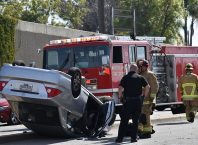The accidental death of Daunte Wright, a 20-year-old man, by a police officer after a traffic stop in Brooklyn Center, Minnesota, has increased debate over police and the need to enforce so-called “nanny laws”. Wright was shot by Kim Potter — a former police union president and a 26-year Brooklyn police force veteran. Potter accidentally mistook her taser and her firearm in the split-second decision that took the young man’s life. Wright had called his mother after the police had made the routine stop to tell her that he had been pulled over due to an illegal air freshener hanging from the car’s front mirror.
Wright’s unfortunate encounter with the Brooklyn police force that night is another in a series of high-profile police shootings that many people in the US want to use as a reason to minimize police interaction with the public. The National Police Association understands that unfortunate events like the one with Wright should never have happened, but beg the question, “If police stopped enforcing minor infractions, how many times would a real criminal stay on the streets rather than being identified through a minor infraction stop?’
Contents
Police Enforcement of “Nanny” Laws
Social justice activists argue that Mr. Wright’s death is another unnecessary case of police enforcement of “nanny” laws. They also argued that reducing police interactions with the public over minor interactions will decrease incidences that turn violent and fatal.
The nanny state is a term that originated from Britain’s mass population that plays on how a government or its policies are too protective or meddle in the inconsequential, personal choices of their citizens. “Nanny Laws” likens government policies or laws to nanny’s roles in child-rearing. The British and American tobacco industry popularized the term “nanny state.” Some political commentators in the United States started the use of the term by the 2000s. It was used against the legislation of liberal political ideologies like banishing public smoking and enactment of bicycle helmet laws.
“Nanny” laws include ordinances, rules, and requirements, including prohibiting the wearing of baggy pants, making it illegal to drive a car with one license plate, and selling loose cigarettes. In 2012, New York City mayor Michael Bloomberg proposed a restriction on the sale of soft drinks in restaurants, venues, and sidewalk carts to 16 ounces. As a result, the mayor was referred to as “Nanny Bloomberg.”
National Police Association on Small Offenses Crack Down
Unlike social justice activists and libertarians who advocate for minimal police interaction with the public, especially on minor offenses, Politicians and police officials have a different opinion. They argue that it is essential to crack down on petty crimes to prevent more serious crimes. Also, they maintain that traffic stops over minor offenses have caught violent felons, sex traffickers, and terrorists.
According to the police report, Wright was stopped for driving with expired tags. Only after pulling over did Officer Kim Potter notice the air freshener hanging from the mirror, which is also a violation. Police also discovered that there was a warrant to arrest Wright for attempted armed robbery. He was also accused alongside another man of choking and robbing a woman at gunpoint in 2019. The case was still pending by the time of his death.
National Police Association spokesperson Betsy Brantner Smith said if Mr. Wright’s traffic stop had not escalated, the police would have arrested another accused criminal. “We would have had back in custody a violent offender who was already accused of aggravated robbery against a woman and gun offenses, which is what we are talking about today,” she said.
The founder of Black Lives Matter Sacramento, Tanya Faison, has a different opinion. She argues that minor traffic offenses allow police officers to take advantage of Black people. However, the conservative Cato Institute senior vice president, Clark Neily, said the blame is not on politicians. These laws help police officers stop someone for minor offenses and search for more serious violations like illegal firearms and drugs. Ms. Brantner Smith added that traffic stops for these minor violations are vital investigative tools used by officers to stop and investigate other crimes.
The National Police Association is a non-profit organization whose mission is to educate law enforcement supporters to help police departments meet their goals. Learn more about the National Police Association on https://nationalpolice.org/.












